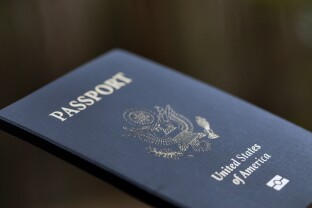President Donald Trump’s recent executive order declaring that the U.S. recognizes “only two sexes, male and female,” will not impact passports issued before the start of his term to transgender and nonbinary people that have their preferred gender or “X” marker.
The White House told NOTUS that Monday’s executive order is not retroactive and does not invalidate old passports. However, if government-issued documents need to be renewed, they must reflect the person’s sex assigned at birth.
“They can still apply to renew their passport — they just have to use their God-given sex, which was decided at birth,” White House press secretary Karoline Leavitt said. “Thanks to President Trump, it is now the official policy of the federal government that there are only two sexes — male and female.”
Trump’s order directs the departments of State and Homeland Security and the Office of Personnel Management to implement changes to “require that government-issued identification documents, including passports, visas, and Global Entry cards, accurately reflect the holder’s sex.”
It’s unclear when that will happen, given Secretary of State Marco Rubio is the only cabinet official who has been confirmed.
LGBTQ+ rights groups urged trans and nonbinary people to update documents like passports, Social Security cards and driver’s licenses ahead of Trump’s return to the White House. While those documents remain valid, advocates expect lawsuits to challenge Monday’s order.
“Now we’re going to look at what they actually do and when people’s rights are actually affected, then there will be lawsuits,” said Jennifer Pizer, chief legal officer at Lambda Legal, a firm that supports LGBTQ+ rights.
Lambda Legal represented Dana Zzyym, an intersex and nonbinary veteran who challenged the State Department in 2017 for refusing to recognize their preferred gender marker. Zzyym argued that the “male” and “female” markers were inaccurate for intersex and nonbinary people. Ultimately, a federal court sided with Zzyym, and they became the first person with an “X” marker on their passport in 2021.
In 2022, the State Department announced that the “X” designation would be available for people who select it on their passport application forms. Trump’s new order reverses that decision.
“There have been a number of federal courts that have rejected arguments from states that have wanted to deny people updated gender markers on driver’s licenses, birth certificates. And, in most of the circumstances, the federal courts have ruled that it is a violation of the 14th Amendment to deny a transgender person the ability to update their gender markers,” said Sarah Warbelow, vice president of legal for the Human Rights Campaign. “So there’s definitely precedent on this, besides the Dana Zzyym case.”
While the Supreme Court has not ruled on cases specifically pertaining to a person’s gender marker and is currently evaluating a case that will decide whether bans on gender-affirming care are constitutional, advocates pointed to the 1996 Romer v. Evans case, where the justices decided that a state cannot discriminate against homosexual or bisexual people because it violates the 14th Amendment’s Equal Protection Clause.
For social conservatives, Trump’s order was an achievement. The president had made anti-trans messaging a key part of his campaign.
“I think this is stronger than probably most social conservatives anticipated,” said Jon Schweppe, the policy director for American Principles Project. “It’s across the board, you know, sex is sex.”
When asked about what the order means for the existence of trans and nonbinary people, given that Trump’s order says the “two sexes” are “not changeable,” Schweppe said that “this is acknowledging that from now on the policy of this government is going to be to acknowledge biological sex.”
“How someone presents themself or what have you, you know, I don’t think anyone’s trying to do a dress code or anything like that, but ultimately for the purposes of identification, for the purposes of all the things mentioned in the order … we are going to acknowledge biological sex,” he added.
Twenty-two percent of respondents of the 2022 U.S. Trans Survey, the largest survey of trans people in the country, reported “being verbally harassed, assaulted, asked to leave a location, or denied services” when they showed someone an ID with a name or gender that did not match how they present themselves.
—
Oriana González is a reporter at NOTUS.
